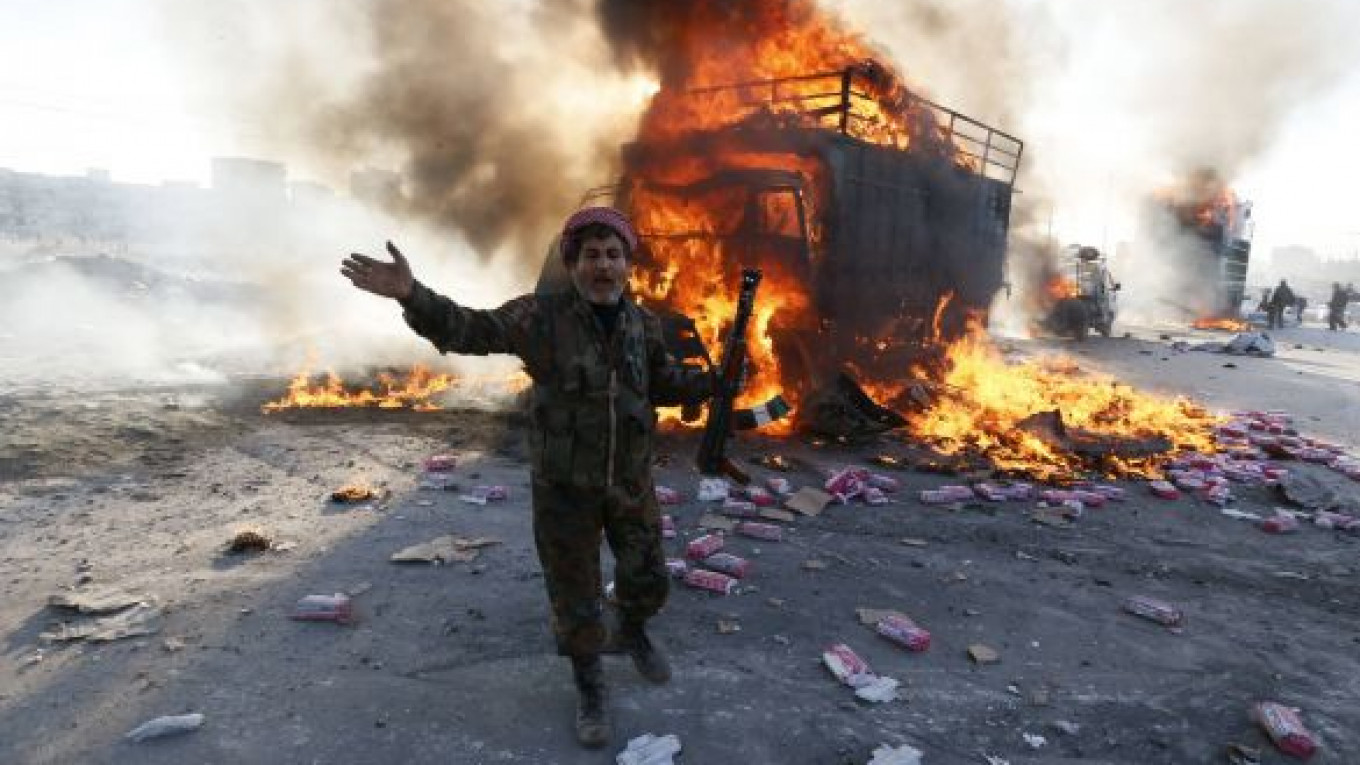LONDON — In recent weeks Russia has stepped up supplies of military gear to Syria, including armored vehicles, drones and guided bombs, boosting President Bashar Assad just as rebel infighting has weakened the insurgency against him, sources with knowledge of the deliveries say.
Moscow, which is trying to raise its diplomatic and economic influence in the Middle East, has been a major provider of conventional weapons to Syria, giving Assad crucial support during the three-year civil war and blocking wider Western attempts to punish him with sanctions for the use of force against civilians.
The new Russian supplies come at a critically fluid stage of the conflict, with peace talks scheduled for next week in Switzerland, the factious opposition losing ground, and Western support for the rebellion growing increasingly wary of the role played by foreign militants. Syria has even said some countries formally opposed to Assad have begun discussing security cooperation with his government.
Several sources told Reuters that Assad's forces had since December received deliveries of weaponry and other military supplies, including unmanned spy drones known as UAVs, which have been arranged by Russia either directly or via proxies.
"Dozens of Antonov 124s [transport planes] have been bringing in armored vehicles, surveillance equipment, radars, electronic warfare systems, spare parts for helicopters, and various weapons including guided bombs for planes," a Middle East security source said.
"Russian advisers and intelligence experts have been running observation UAVs around the clock to help Syrian forces track rebel positions, analyze their capabilities, and carry out precision artillery and air force strikes against them," said the source, who declined to be identified.
Vyacheslav Davidenko, spokesman for Russia's arms export monopoly Rosoboronexport, said they could not comment on arms deliveries to Syria.
Russia has said it violated no international laws with its military supplies to Syria and does not sell Damascus offensive weapons.
Syrian officials could not be reached for comment.
Lucrative Contracts
A source within the international arms industry with knowledge of Middle Eastern weapons movements also confirmed a pick-up in supplies to Assad's forces, including UAVs.
"Equipment has been moving into Syria, and Russia is either bringing it in themselves or sourcing supplies from Black Sea areas like Bulgaria, Romania or Ukraine, where there is surplus stock floating around," the source said. "Suppliers in that region cannot afford to upset the Russians."
Arms trackers say Bulgaria, Romania and Ukraine all have stockpiles of Russian-styled light arms that were produced in the countries dating back to the Soviet era, when factories were set up with help from Moscow.
A Bulgarian foreign ministry spokesman said Bulgaria's intergovernmental council, which oversees arms trades, had not issued any certificates for arms deals destined for Syria.
"We have data that shows that Bulgaria has not authorized any arms sales to Syria," he said.
Former foreign minister Solomon Passy said it was "very unlikely" that Bulgaria, as a NATO and European Union member, would be involved in such shipments.
A Ukraine foreign ministry spokesman said the former Soviet republic had already denied allegations of arms supplies and transfers last year when it said Kiev had voluntarily and completely stopped military and technical cooperation with Syria since May 2011.
Romanian officials did not immediately respond to requests for comment.
The arms industry source said: "Stuff is definitely coming into Syria, and Russia realizes they have to keep Assad in power if they want to keep a hold of what they have there, especially with oil and gas reserves up for grabs."
Russian oil and gas company Soyuzneftegas signed a $90 million deal with Syria's oil ministry in December for oil exploration and production in a 2,190-square kilometer bloc of Mediterranean waters off the Syrian coast between Tartous and Banias.
Syrian oil officials say they are confident their waters hold significant oil or gas reserves, pointing to substantial discoveries in the eastern Mediterranean off Israel and Cyprus and promising surveys carried out in the waters of Lebanon.
Moscow says its Middle East diplomacy is based on standing up for the principles of international law and upholding the role of the United Nations.
The situation also offers Russia an opportunity to show it still has weight on the world stage and to win potentially lucrative contracts once the fighting is over in Syria and the dispute over Iran's nuclear program ends.
Russia is particularly keen to establish and keep a foothold in the Middle East through Syria and Iran because it lost out during the Arab Spring revolutions, particularly in Libya, where it had backed Moammar Gadhafi.
Reuters last week revealed that Russia is negotiating with Iran an oil-for-goods swap worth $1.5 billion a month that threatens to undermine sanctions that helped persuade Tehran to agree a preliminary deal to curb its nuclear program.
Need for Supplies
Tom Wallace, of U.S.-based non-profit conflict research group C4ADS, said: "Assad absolutely needs to keep refreshing his supplies. People's minds most obviously go to bullets, but they underestimate what an incredibly heavy logistical burden a modern mechanized military really is."
"Tank treads, helicopter blades, jet fuel, ball-bearings, gyroscopes — virtually every component of every piece of equipment can and will break down without maintenance and or replacement."
James Bevan of Conflict Armament Research, who tracks weapons for governments and other organizations, said Syria's munitions use had been high for two years.
"Further evidence of that is that they have been using barrel bombs dropped out of helicopters, which may suggest that they are running low on air-launched or air-delivered munitions," he said.
Britain has accused Syria's government of committing "yet another war crime" by spraying civilian areas with barrel bombs — oil drums or cylinders that are packed with explosives and metal fragments and dropped from aircraft.
By Air and by Sea
A Syrian opposition source said some supplies had been delivered to Syria's Latakia airport about three weeks ago, with further equipment reaching through the country's major cargo ports in Tartous and Latakia.
The source said the port of Tartous, which is also the location of Russia's naval base, had been sealed off for several hours more than three to four weeks ago.
"During the time, nonauthorized personnel were not allowed to enter, and it is a sure sign a delivery came through. This happens from time to time when supplies come in, usually at night."
The Middle East security source added: "Given the risk of rebel attack on arms depots and landing strips at Syrian air bases, Russia has also been shipping large amounts of small arms and munitions to Tartous and Latakia, allowing Assad's forces to keep fighting apace."
C4ADS's Wallace said past shipments of Russian military cargo had also come by both air and sea.
"Lighter, less sturdy equipment often is loaded onto a plane, whereas large and heavy shipments typically are loaded onto a ship of some kind," he said.
"Wheeled vehicles would need to be transported on a roll-on, roll-off ramped ship, but most smaller stuff could be containerized and loaded onto a standard cargo ship," said Wallace, who co-authored a recent report into arms transfers from Russia and Ukraine.
A Message from The Moscow Times:
Dear readers,
We are facing unprecedented challenges. Russia's Prosecutor General's Office has designated The Moscow Times as an "undesirable" organization, criminalizing our work and putting our staff at risk of prosecution. This follows our earlier unjust labeling as a "foreign agent."
These actions are direct attempts to silence independent journalism in Russia. The authorities claim our work "discredits the decisions of the Russian leadership." We see things differently: we strive to provide accurate, unbiased reporting on Russia.
We, the journalists of The Moscow Times, refuse to be silenced. But to continue our work, we need your help.
Your support, no matter how small, makes a world of difference. If you can, please support us monthly starting from just $2. It's quick to set up, and every contribution makes a significant impact.
By supporting The Moscow Times, you're defending open, independent journalism in the face of repression. Thank you for standing with us.
Remind me later.






